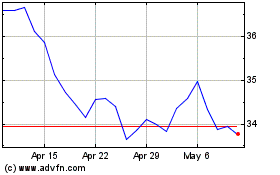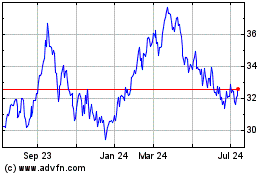The rally that pushed Shanghai shares into bull market territory
this week singles out China's market from others in Asia, where a
stronger U.S. dollar is pressuring firms.
The Shanghai Composite Index and the Shenzhen Composite Index
are each up roughly 4% for the week as of Thursday's close.
Shanghai entered a bull market on Thursday, rising 20% since Aug.
26, the bottom of what had been a volatile summer selloff for
mainland equities. A bull market is defined as a rise of 20% from a
recent low.
Performance elsewhere has been lackluster, as central banks in
Australia and Japan dashed investors' hopes of adding stimulus for
now, despite an uncertain economic outlook.
Australia's S&P/ASX 200 is on track to shed 0.8% this week
and Japan's Nikkei Stock Average is on track to gain 0.8%. Hong
Kong's Hang Seng Index is up 1.2% for the week so far.
Trading in the region was tepid early Friday. The Hang Seng was
down 0.6% and the Shanghai Composite fell 0.2%.
The Nikkei and Kospi gained fractionally, while the S&P/ASX
200 slipped 0.5%.
In November, investors have focused on country-specific news,
explaining the "divergence between markets," said Ilya Feygin,
managing director at New York-based brokerage WallachBeth Capital.
That's a shift from October, when global central bank moves tended
to drive markets in one direction: up.
Expectations that the dollar will rise more against global
currencies will pressure companies in Asia, Mr. Feygin added, given
Federal Reserve Chairwoman Janet Yellen has kept a December rate
increase on the table.
A stronger dollar makes it more expensive for firms in emerging
markets, in Asia and globally, to pay off dollar-denominated debt,
which has risen in recent years.
The Wall Street Journal Dollar Index, which compares the
greenback against a basket of 16 commonly traded currencies, has
risen 0.8% this week through its close Thursday in the U.S.
The index rose 0.2% to 89.37 overnight, reaching its highest
level in almost 13 years.
Some analysts expect monthly employment data out of the U.S. on
Friday to firm up expectations of a December rate increase. Ms.
Yellen said earlier in the week that the central bank could raise
rates by year-end if the U.S. economy remains on track.
U.S. stocks closed slightly lower overnight, as investors shied
from making broader market bets ahead of the release.
One market benefiting from the dollar's relative strength,
however, has been Japan.
A weakening yen, down roughly 0.9% against the U.S. dollar this
week, helps make Japanese goods more competitive, and has lifted
shares of exporters.
The yen was last at ¥ 121.69 to one U.S. dollar, down 0.1%
compared with its level late Thursday in Asia.
Shares of Japan Post Holdings Co. and its financial units have
gained by double digits since they started trading on Wednesday for
the first time. Analysts said the initial public offering of the
state-owned mail delivery business, the largest privatization for a
Japan firm in decades, signaled investor confidence in Prime
Minister Shinzo Abe's corporate reforms.
Shares of Japan Post Holdings, Japan Post Bank Co. and Japan
Post Insurance Co. are up 27%, 18% and 69% from their respective
premarket IPO prices.
Meanwhile, shares of Takata Corp. fell 13% on Friday, amid
allegations the firm misrepresented and manipulated test data for
its air-bag inflaters.
The stock fell 25% the previous day, as more Japanese auto
makers followed Honda Motor Co.'s footsteps and signaled they may
avoid using certain air-bag inflaters made by Takata in their new
vehicles.
China's stock market was leading gains this week after the
central bank had published an out-of-date statement on Tuesday
about a possible Shenzhen-Hong Kong trading link launching this
year. The comments nevertheless fueled excitement about an influx
of foreign money, pushed up some local brokerage shares up 10% for
two days in a row. The gains were enough to tip the Shanghai
Composite into bull territory, an astounding milestone after a
volatile summer wiped out trillions of dollars in value from
mainland equities and rattled global markets.
Some analysts have said that state-back funds, first tasked to
support the market during the throes of the selloff in July, may
have made another push this week to increase holdings in blue
chips.
Elsewhere, brent crude oil was up 0.3% at $48.12 a barrel in
early Asia trade Friday.
U.S. oil prices slid overnight as a bigger-than-expected
increase in U.S. oil stockpiles, falling product prices and strong
production number out of Russia kept gains in check.
Gold prices were flat at $1,105.10 a troy ounce.
Write to Chao Deng at Chao.Deng@wsj.com
Subscribe to WSJ: http://online.wsj.com?mod=djnwires
(END) Dow Jones Newswires
November 05, 2015 21:35 ET (02:35 GMT)
Copyright (c) 2015 Dow Jones & Company, Inc.
Honda Motor (NYSE:HMC)
Historical Stock Chart
From Mar 2024 to Apr 2024

Honda Motor (NYSE:HMC)
Historical Stock Chart
From Apr 2023 to Apr 2024
